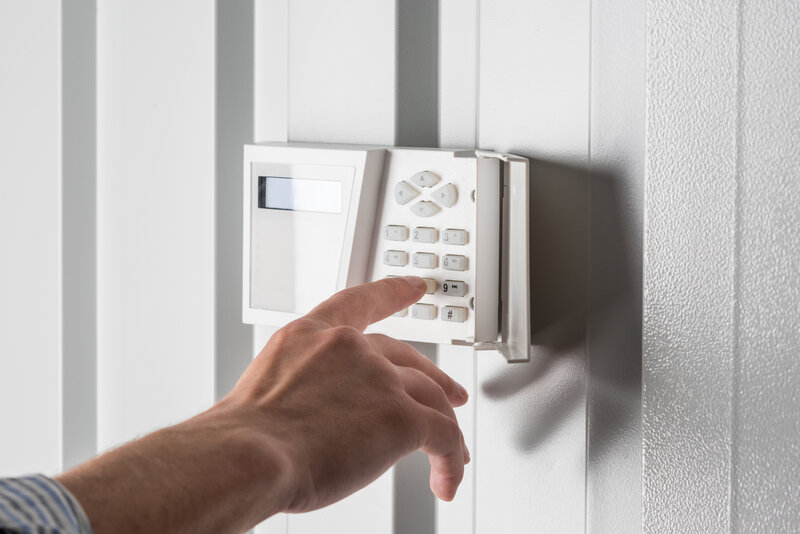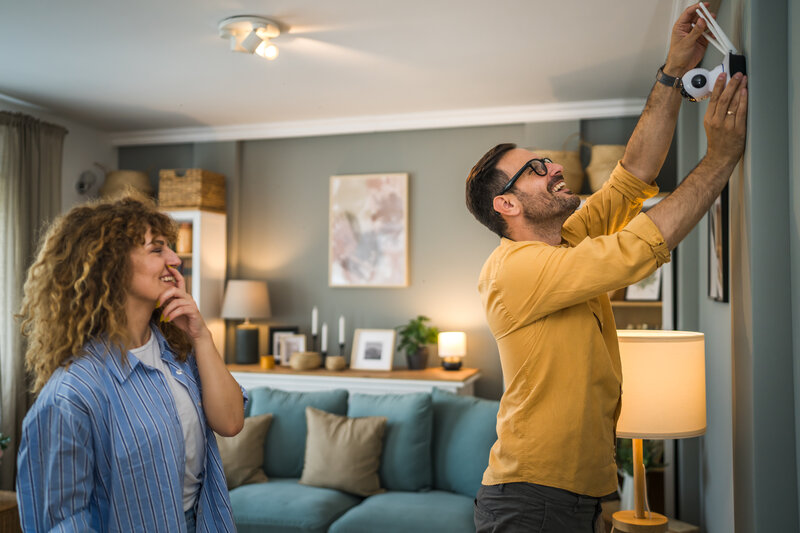
Is a smart security system for your home something you can put together and install yourself, or should you leave it to a professional?
Smart security systems have become integral to modern home safety, offering unparalleled convenience and peace of mind. As homeowners increasingly seek to integrate these advanced technologies into their lives, the question of whether to embark on a do-it-yourself project or to enlist professional installation services becomes pivotal. This article is tailored for individuals contemplating installing a smart security system, weighing the pros and cons of DIY versus professional approaches.
Here we will provide a comprehensive guide that will assist you in making an informed decision that aligns with your personal preferences, technical aptitude, and budgetary constraints. Focusing on clarity and practical advice, we will explore the nuances of each installation option, ensuring you are well-equipped to choose the path that best secures your home and fits your lifestyle.
Understanding Smart Security System
A smart security system is the epitome of modern home protection, merging digital advancements with established security practices. These sophisticated networks consist of various devices—such as intelligent cameras, motion sensors, and smart locks—all working in concert to fortify your home or business.
At the heart of these systems lies a central hub or a unified network that orchestrates the seamless operation of each component. This connectivity allows real-time monitoring and management from anywhere, using a smartphone, tablet, or computer. Users gain access to live video streams, receive instant alerts of unusual activity, and can even remotely manage entry to their property.
These systems don’t just stop at basic functionality; they often boast cutting-edge features like facial recognition, compatibility with voice-activated assistants, and integration with broader smart home systems. This level of customization and automation—such as scheduling doors to lock at a specific time—offers a personalized security experience that traditional, isolated systems cannot match.
Grasping the technical underpinnings and potential of smart security systems is essential. This knowledge forms the foundation for deciding whether to take on installation yourself or to defer to the expertise of professionals—a decision we will delve into next.
DIY vs Professional Installation: Evaluating The Best Fit For You
When installing a smart security system, the choice between the do-it-yourself (DIY) method and professional installation is not to be taken lightly. It’s a decision that hinges on personal preferences, technical savvy, and your expectations for home security.
Benefits and challenges of DIY installation

Embarking on a DIY installation journey with smart security systems can be rewarding and economical. The allure of trimming expenses is undeniable, as homeowners sidestep the professional installation fees and direct their funds toward premium devices or extra layers of security.
The DIY route also paves the way for a bespoke security environment. Enthusiasts revel in the liberty to mix and match components across various brands, piecing together a system that resonates with their unique security demands. This customization extends to the setup process, allowing individuals to place devices that align with their spatial layout and personal preferences.
Another perk of self-installation is the intimate knowledge gained about the system’s inner workings. This insight proves invaluable for ongoing upkeep or when quick fixes are required, empowering homeowners with the know-how to address minor issues independently.
Yet, these upsides are coupled with notable hurdles. The intricacies of ensuring seamless device interoperability can be daunting. A robust understanding of network configurations is essential, as smart security systems depend on reliable connectivity to function effectively. A gap in this knowledge could lead to vulnerabilities in the security framework.
Moreover, the stakes of installation errors are high, with potential security gaps emerging from improper setup. Those less versed in the nuances of modern security technology might inadvertently configure systems in ways that compromise their protective capabilities.
Lastly, the aspect of support must be considered. While DIY installations offer initial control, they often need more comprehensive support accompanying a professionally installed system. Access to expert troubleshooting, repair services, or warranty support may be more challenging to obtain, which could dilute the initial cost benefits and customization advantages.
Professional installation: ensuring expertise and convenience

Choosing professional installation for smart security systems brings a wealth of expertise and ease. Homeowners gain the advantage of seasoned technicians whose training spans various brands and models, ensuring devices function at peak performance.
Installers consider the unique characteristics of a residence and the homeowner’s daily routines when recommending and configuring systems. Their proficiency results in strategic device placement for optimal coverage and fine-tuning of sensors to minimize false triggers while maximizing detection capabilities.
The convenience offered by professional installation cannot be overstated. Homeowners are relieved of the intricate tasks associated with setup, from the initial system design to the final operational checks. This expedited process allows for a swift transition to a secure and fully functional system, bypassing the steep learning curve associated with self-installation.
Furthermore, professional services come with robust support, encompassing maintenance, technical assistance, and warranty services that prove invaluable over the system’s lifespan. Installers also provide comprehensive tutorials on system operation, bolstering the homeowner’s confidence and proficiency with the technology.
It’s important to note that some advanced security systems may necessitate professional installation due to their proprietary nature or complex integration requirements, which could be beyond the reach of DIY efforts.
In essence, opting for professional installation not only guarantees a correct and swift setup but also integrates the system flawlessly into the home environment. Homeowners enjoy peace of mind and convenience, free from the potential pitfalls and extensive preparation associated with the DIY path.
Cost Implications Of Your Choice
When weighing the options of DIY versus professional installation for your smart security system, the financial aspect plays a pivotal role. The initial investment and ongoing costs can differ markedly, depending on your route.
Opting for DIY installation primarily cuts out labor expenses. Those with the know-how can set up their system after purchasing the necessary equipment, typically at retail price points. This route may seem more wallet-friendly at the outset. Yet, it’s crucial to factor in the hidden costs that could arise from errors or suboptimal installation, which may lead to additional outlays for troubleshooting or equipment replacement.
On the other hand, professional installation carries a heftier initial price tag, reflecting the expertise of the installer and their tailored security solutions for your home’s unique needs. While this means a more significant upfront cost, the long-term financial benefits can be substantial. Service packages and extended warranties often accompany professional installations, potentially reducing future maintenance expenses. Additionally, some insurance providers may offer discounts on homes with professionally installed systems, acknowledging the lower risk profile of expertly set up security measures.
Professional setups might lock you into proprietary systems, which can come with pricier add-ons or upgrades down the line. These systems frequently include monitoring service subscriptions, adding a recurring cost that DIY systems might need to have.
Ultimately, deciding between DIY and professional installation involves more than the initial cost. Homeowners must weigh the upfront savings against the assurance of long-term dependability and the possibility of future financial advantages that come with a professionally installed system.
Technical Skills And System Complexity
Your chosen smart security system’s intricacy and technical prowess are critical factors in deciding between a DIY or professionally installed setup. Smart security systems vary widely, from user-friendly kits to complex networks that demand a deeper understanding and specific tools.
For those with a knack for technology—particularly in areas like home networking and electrical tasks—installing a basic system may be well within reach. These individuals should feel at ease with tasks such as configuring wireless networks, maintaining robust device connectivity, and installing wired components.
However, the complexity of the system can be a game-changer. A straightforward setup with several sensors and a central hub might be manageable for a DIY enthusiast. However, the installation process becomes significantly more challenging when introducing more sophisticated features, such as smart locks, networked smoke alarms, and cameras with advanced features.
Moreover, DIY installers must be adept at software management, which includes updating firmware, fine-tuning sensor settings, and crafting automation sequences. This technical understanding is essential for resolving any issues independently.
Conversely, professional installers bring a wealth of experience to complex installations. They come prepared with the necessary tools and expertise to tackle specialized tasks, ensuring seamless integration and performance. They’re also adept at anticipating and addressing potential compatibility issues among devices from different brands.
The investment in professional installation could be well worth it for those who may be less technically inclined or are looking at a more sophisticated system. It guarantees that your system’s capabilities are maximized, sparing you the stress and time of navigating the technicalities yourself.
Warranties And Support
Navigating the intricacies of warranties and support is a pivotal aspect of deciding between a DIY and professionally installed smart security system. The scope and duration of warranty coverage and the support options available are vital to protecting your investment.
Understanding warranty terms is essential for those who opt to install their security systems themselves. Although the equipment may be covered by a manufacturer’s warranty, incorrect installation could invalidate this protection. It’s incumbent upon DIY enthusiasts to meticulously adhere to installation guidelines to maintain their warranty eligibility. Support from manufacturers typically centers on hardware issues, leaving the installer to troubleshoot any installation challenges without external assistance.
Conversely, professional installation services frequently bundle product and service warranties, offering a more robust safety net in the event of system failure, whether due to hardware faults or installation oversights. The expertise of professionals often comes with a service guarantee, a level of assurance that DIY solutions rarely match.
Support from professional installers extends beyond the initial setup, providing comprehensive and prompt post-installation assistance. This can include everything from routine maintenance to on-demand troubleshooting, backed by a dedicated customer service team. For individuals who are less comfortable with technology or who are dealing with complex systems, this support can be a determining factor in favor of professional installation.
Additionally, many professional services offer extended service plans that prolong the initial support period. These plans can address a range of situations, from updating equipment to emergency repairs, ensuring swift, professional intervention when needed, and sparing the homeowner from additional stress and time commitment.
The warranties and support provided by professional installation services can add significant value to a smart security system. Homeowners should weigh the assurance and convenience of professional coverage against the self-sufficiency required for a DIY installation. While the DIY path may seem cost-effective at first glance, the extended coverage and support from professionals may be more beneficial over the system’s lifetime.
Security, Reliability, And Time Considerations
Deliberating between DIY and professional installation of a smart security system requires careful consideration of security, system reliability, and the time investment involved.
For DIY installations, the security level hinges on the homeowner’s proficiency in correctly positioning sensors and cameras, as well as securing network communications against potential threats. The responsibility for regular system maintenance and updates also falls to the homeowner, which is vital for mitigating vulnerabilities and ensuring long-term reliability.
In contrast, professionals bring a wealth of knowledge to the table, ensuring optimal device placement and hardened network security to guard against cyber threats. Their adherence to industry standards minimizes the risk of errors in setup or configuration, enhancing overall system reliability.
The time commitment for a DIY project can be substantial, often entailing in-depth research and hands-on work to get the system up and running.
The time spent can quickly surpass initial estimates, especially for those unfamiliar with smart home technology or installing elaborate systems.
With their experience and expertise, professional installers can expedite the installation process, minimizing the disruption to your household. For many, the time saved by enlisting professionals is invaluable, allowing them to focus on other priorities without compromising their home’s security.
When deciding between DIY and professional installation, homeowners must balance their desire for a secure and dependable system against their willingness to dedicate personal time to the endeavor. Opting for professional services can offer a swift and secure setup, providing peace of mind that may not be as readily achieved with a DIY approach.
Making Your Decision
When selecting the proper installation method for your smart security system, the decision rests on a tapestry of personal preferences and practical considerations. To navigate this choice with clarity, ponder the following elements:
First, take a candid look at your technical prowess. If you’re adept with technology, comfortable with setting up networks, and unfazed by potential hiccups, a DIY approach might be right up your alley. But tread carefully; sophisticated systems demand a deeper level of expertise.
Next, turn your attention to the system’s intricacy. Sophisticated setups that require seamless interaction between various devices and offer a suite of features are typically best left to the professionals. This ensures they function at their peak and are as reliable as possible.
Then, revisit the financial aspect. Initial savings from a DIY install are tempting, but unforeseen costs can emerge, such as those stemming from inefficiencies or the eventual need for expert intervention.
Also, consider the support and warranty that accompany your installation choice. Professional setups usually include robust warranties and reliable customer service, tipping the scales for those prioritizing ongoing support and hassle-free maintenance.
Furthermore, scrutinizes the security and dependability of the installation. The expertise of a professional installer can provide a layer of assurance against system vulnerabilities—a level of protection that might be elusive with a self-installed system.
Finally, weigh the value of your time. If your schedule is tight and you’d rather not embark on a time-consuming project, the convenience of a professional installation is invaluable.
In essence, your decision should reflect your comfort with technology, the complexity of the desired system, budgetary considerations, your appetite for risk, and how much time you’re willing to invest. Deliberate on these points to make a choice that effectively meets your expectations and secures your home.
Frequently Asked Questions
What are the cost implications of DIY vs. professional installation of smart security systems?
DIY installation generally costs less than professional installation since you eliminate labor costs. However, professional installation can provide value for complex systems, ensuring optimum performance and reducing the risk of user errors.
Does DIY installation require technical expertise?
DIY installation of smart security systems can be done with a basic technical understanding. Progress in technology has simplified setup processes, making it possible for non-technical homeowners to install systems successfully.
How reliable are DIY smart security systems compared to professionally installed ones?
The reliability of smart security systems, whether DIY or professionally installed, typically depends on the quality of devices and correct installation. Even so, professional installations often benefit from an expert’s touch, ensuring all system elements interact seamlessly.
What are the benefits of hiring a professional for smart security system installation?
Hiring a professional for smart security systems installation offers several advantages. An expert ensures an optimal equipment layout, can troubleshoot issues during setup, and provides training for system use. Professional installation also typically includes system maintenance and support.
Can I switch from a DIY to a professionally installed security system later?
Yes, homeowners can switch from a DIY to a professionally installed security system if requirements or circumstances change. Some companies offer conversion kits or services for such situations.
Is the decision between DIY and professional installation of smart systems solely dependent on cost?
While cost is a significant factor, the decision depends on personal preference, technical ability, time availability, and the desired level of system sophistication. Sometimes, homeowners pay a premium for professional assurance and continued support.
